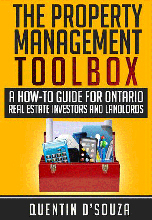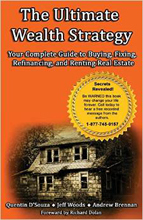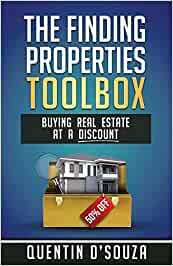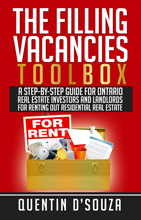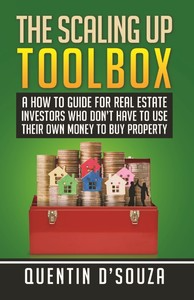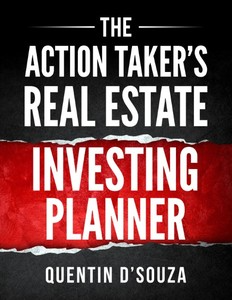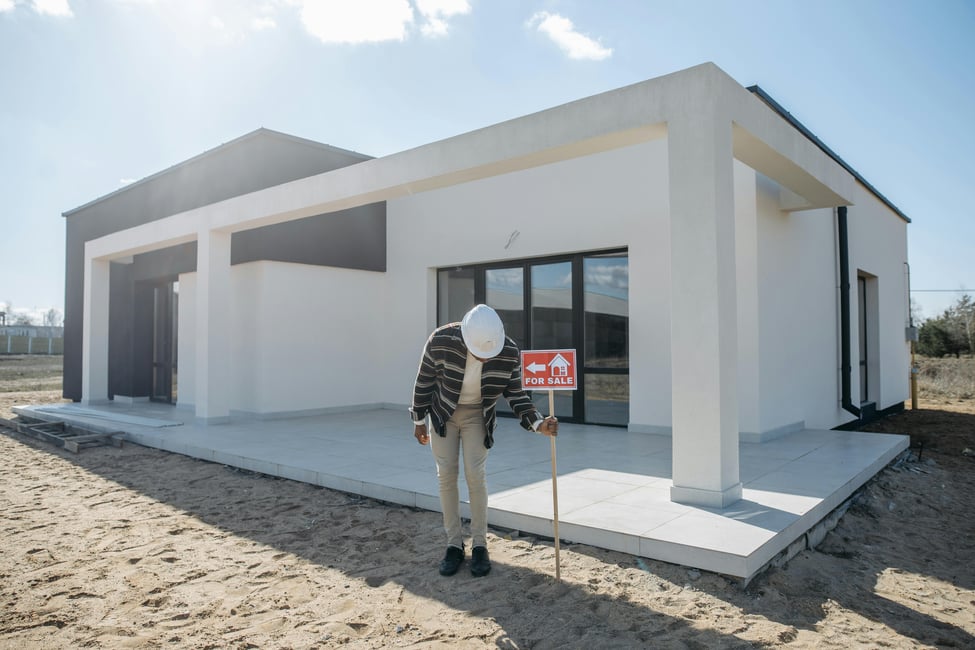In our February 2025 newsletter, I featured an interview with Quentin D’Souza, of podcast GetRealWealthy.com and a seasoned investor with a deep understanding of the real estate market.
With years of experience in helping individuals build wealth through strategic real estate investments, Quentin shares valuable tips, strategies, and mindset shifts for both newcomers and seasoned investors looking to make the most of their opportunities. Whether you’re just starting out or looking to take your investment game to the next level, this interview is packed with wisdom you should should read!
Let's Dive In!
Carol: What are the first steps someone should take when considering real estate investing?
Quentin: Well, the first thing to figure out is what your goals are. Are you looking to create wealth, or is it more about generating income? Your goals will determine the strategy you choose. For example, if your goal is to generate income, flipping houses might be a good strategy. However, flipping focuses on income, not long-term wealth creation. On the other hand, if you're aiming for long-term wealth, a buy-and-hold strategy could be more suitable.
So, before diving in, it’s crucial to clarify your long-term objectives. I recommend looking at your 10-year goals, breaking them down into 3-year goals, and even further into quarterly goals. Then, you can start taking actionable steps toward those. Planning is key.
Carol: How do you decide what strategy to use?
Quentin: It really depends on the area where you’re investing. Not all strategies work in all areas. For example, you can’t just buy a single-family home in Toronto and expect it to cash flow well. It’s just not realistic in some markets. If the strategy you want to use doesn’t fit the area, then maybe you should consider investing elsewhere or adjust your strategy.
If you're unwilling to adjust, you could find yourself losing thousands every month because the numbers don't work. I’ve had people approach me with condo investment deals in downtown Toronto, for instance, where the numbers show negative cash flow—sometimes $2,000 or $3,000 a month. They might expect huge appreciation, but that’s speculative and not how I like to run things. For me, cash flow is what keeps an investment sustainable. If it doesn't cash flow, it’s not worth the risk, regardless of the potential upside.
Carol: Can you give an example of how strategy plays into these decisions?
Quentin: Absolutely. A few years ago, I had dozens of people reach out to partner on condo investments in downtown Toronto. When I looked at the numbers, it just didn’t make sense. The properties were showing negative cash flow with unrealistic expectations of future appreciation. I’ve never partnered on those deals because they didn’t align with my strategy of focusing on cash flow and long-term holding.
In contrast, when I was flipping properties in 2012-2013, I was doing duplex conversions. I was buying properties for around $200,000 and selling them for $350,000. Those properties have appreciated significantly since then—some are now worth over $800,000. If I had held onto those properties, they would have been worth even more, but at the time, flipping was the strategy I used because I needed to generate income. That income supported my family and helped me transition out of my teaching job.
So, your strategy should align with your financial needs and goals. It’s all about finding what works for you based on the market and your situation.
Carol: Thanks for sharing that. It seems like planning and understanding the local market are key elements when it comes to real estate investing.
Quentin: Exactly. Without the right planning and the right strategy for the area you're investing in, you're setting yourself up for potential losses. Make sure you know your numbers and adjust your strategy accordingly.
Carol: What are some common mistakes new investors make, and how can they avoid them?
Quentin: One of the biggest mistakes new investors make is over-leveraging themselves. It’s important to ensure that you’re not stretching your finances too thin. Another key mistake is not properly underwriting a property. Many new investors don’t fully account for things like repairs, maintenance, vacancy rates, and property management costs. They also sometimes misinterpret how cash flow works.
For instance, people often treat their principal repayment as income, but that's not accurate. The principal payment isn’t income—it’s an expense until you sell the property. Only after the sale, when you’ve gained equity, can you consider that as part of your returns. Cash flow is what remains after all the expenses, including mortgage interest and principal payments, repairs, and other operational costs. If you're not left with a positive number after all of that, you're not truly cash flowing on the property.
Carol: So, understanding expenses is crucial?
Quentin: Exactly. You need to be realistic about the full costs of owning and managing a property. Many beginners overlook those ongoing expenses and end up with an unrealistic expectation of profitability.
Another common mistake is taking advice from people who haven’t been through the ups and downs of real estate investing themselves. It’s essential to trust those who have real experience—people who have owned properties for years, navigated different market cycles, and understand how to handle tough situations.
Carol: Why is it so important to trust experienced investors?
Quentin: Well, experienced investors know how to weather challenges. For instance, someone who's been through multiple market cycles can understand how to manage their portfolio when interest rates rise, or when the market isn’t as favorable. They know how to hold onto properties without getting forced into desperate situations, like having to sell at a loss or being featured in the news for making poor financial decisions. That’s not where you want to find yourself.
If you're new, seek out mentors or advisors who have seen it all and can offer guidance based on real-world experience, not just theory. This way, you can learn from their mistakes and avoid making the same ones yourself.
Carol: How do you handle risks and uncertainties in the market?
Quentin: Well, if it were easy, everyone would do it—and that’s why not everyone is successful at it. Risk is subjective. For example, when I was investing in real estate while I was a teacher, my teacher friends would have seen everything I did as risky. And even some real estate agents I know might have looked at some of the properties I owned as risky. But the reality is, risk depends on your knowledge and experience.
The more you learn and adapt, the better you get at managing risk. A lot of people struggle with this because they don’t have the experience or the willingness to learn from others. That’s where mentorship and guidance come in. You have to lean on the experience of those who’ve already been through the ups and downs until you gain your own.
Carol: So, it’s about learning from others?
Quentin: Exactly. I’ve been doing this for over 20 years, and I’m still learning. No one knows everything. But because I’ve consistently learned from others who are ahead of me, I’ve been able to build a portfolio of over 580 units in Ontario. We've done extremely well. The key is learning from those who are further along in the process.
That’s why I run Durham REI—I don’t need to, but I enjoy helping others and showing them how they can help themselves. Real estate has been one of the best ways to build wealth that I’ve found, second only to running an active business. And interestingly, most of the people I know who run active businesses often put their profits into real estate when they sell their businesses. It’s a great way to secure financial stability and growth.
For those who own businesses, my advice is simple: own the building that houses your business. It’s a smart way to both write off your interest and build an asset at the same time. What tends to happen is that when business owners go to sell, the building often ends up being worth more than the business itself. That’s why owning the property can be such a game-changer for long-term wealth building. Unfortunately, many business owners miss that opportunity, and it can limit their ability to retire comfortably. So, if you're running a business, don’t just focus on the business—think about the real estate as part of your overall strategy.
Carol: How do you see the real estate investing landscape evolving in the next five to ten years?
Quentin: I think we're going to face some challenges and risks, as we always do. Interest rates have been rising, and I believe they will continue in that direction for now, depending on how inflation plays out. This year is going to be a bit challenging, but by 2027, I think we’ll see a significant shift in the market. There’s going to be a major scarcity in the single-family home and 1-4 unit properties because we’re just not building enough of those types of homes. As a result, supply will be limited, and these properties could perform really well in that kind of market.
On the flip side, in Ontario, we might experience a bit of an oversupply of rental units because a lot of building is happening now. In the short term, that could lead to higher vacancy rates and possibly slightly lower rents, which isn’t ideal. However, if you're in a position to hold onto your properties for 5 to 7 years, I think you'll be well-positioned for success.
Long-term, I believe real estate will continue to be a solid investment because we’re likely going to keep printing money and devaluing currency. These assets will hold their value over time, and as long as you're not trying to “day trade” real estate or flip properties quickly, you should be fine. If you’re aiming to create wealth, holding onto properties for up to 10 years should serve you well in the long run.
Quentin D’Souza is a multiple award winning Real Estate Investor, and a trusted authority on real estate investing. He holds two university degrees, which includes a Master’s in Education. Quentin has appeared on local and national television and radio, interviewed in national publications, and has been a keynote speaker to large audiences of real estate investors.
Quentin is a proud member of the Entrepreneurs’ Organization. His company, Appleridge Homes, uses the Buy, Reposition, Refinance, and Rent strategy on long term rental properties in Ontario, Canada, as well as with joint venture partnerships to create win/win relationships on Apartment Building purchases. Quentin owns a real estate portfolio in excess of $125 million dollars of assets under management across Canada and the US and has transacted on 90+ properties since 2004.
Quentin has also authored and co-authored six books on the topic of investing in real estate, available on Amazon and book stores.
